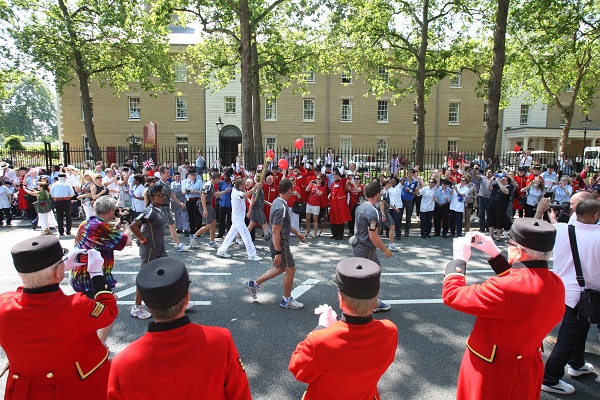Is there any chance that you might, at any point in the next three weeks, be talking to anyone? About anything, in any setting, for any length of time? Then you’d better get a copy of The British Olympics by Martin Polley. Because it won’t matter what the primary purpose of your conversation is supposed to be — you will, in addition, be obliged to talk Olympics. Just a given, I’m afraid. Accepting that, you may as well have something interesting to say. And Polley’s book narrates a very interesting story: the one of how Britain invented the modern Games. It’s especially good to have this story up your sleeve during these particular Olympics, marked as they have been by the IOC’s joy-sapping, freedom-of-speech-infringing clampdown on anything that looks vaguely like five circles or uses any of the letters in the word ‘Usain’. Your essential message can be: ‘How dare you come over here, Jacques Sodding Rogge, issuing your absurd litigious edicts to the nation that started the modern Olympic movement, and so without whom you wouldn’t even have a bloody job in the first place?’
Because start it we did. First recorded use of the word ‘Olympian’ in the English language? Shakespeare, 1591, Henry VI Part 3. First games since the ancient ones to adopt the formal title ‘Olimpick’? Those held in a field near Chipping Campden, 1612. They were a protest against the Puritanism of the time, and as such had rather a ‘jolly’ selection of events, including single-stick fighting and shin-kicking. The Cotswold Olimpicks continue to this day, and still include the shin-kicking, though things have changed since the 19th century, when contestants wore iron-tipped boots and trained by hardening their shins with coal hammers.
Britain continued its use of the word ‘Olympic’ in the Victorian era, as when Pablo Fanque, the country’s first black circus master, took his show (themed around the ‘Olympian Games’) to Rochdale in 1843 and performed ‘For the Benefit of Mr Kite’. (Yes, the show immortalised by the Beatles on Sgt Pepper.) But it was at Much Wenlock that things really got going. The Shropshire town held their first Olympian Games in 1850. None of this beach volleyball nonsense, either: as you’d expect from good upstanding Victorians, the aim was to show how sport could stiffen your character and put hairs on your chest. The menu included athletics, football, archery and other sober pursuits. (Having said that there was also the Gimcrack Race, in which riders had to stop their horses at various points to put on a pair of boots, have a drink and smoke a cigar.) It was after visiting Wenlock in 1890 that the IOC’s founder Pierre de Coubertin, a great fan of Victorian Britain and its attitude to sport, started campaigning for a modern revival of the ancient tradition. The driving force behind the Shropshire games was William Penny Brookes. In 1994 Juan Antonio Samaranch, then head of the IOC, visited Brookes’s grave and called him ‘the founder of the modern Olympic games’. Tribute is paid to him this year by Wenlock being the name of one of the London 2012 mascots.
Much of Polley’s book, of course, centres on the Games of 1908 and 1948. Even here Britain did much to shape the Olympics into their current form. In 1908 we introduced gold, silver and bronze medals, in 1948 the starting block — before that runners had used trowels to dig holes in the track. (Britain can’t claim credit for the Olympic torch, mind you; that was introduced by the Nazis in 1936.) Edwardian pulses raced at the 1908 opening ceremony, where the Danish lady gymnasts performed in outfits that revealed — get this, EL James — their ankles. The swimming pool was an outdoor one, unheated, in the middle of the main White City stadium; hockey and rugby balls occasionally had to be retrieved from it. Forty years later the pool was indoors, in what is now Wembley Arena, though there were still larks aplenty when the boxing ring was built across it. Hungarian and Argentinian officials dived into the water, fully clothed, to celebrate their fighters’ victories.
Indeed it seems that the 1948 Games were scripted by the team behind the Ealing comedies. Fanny Blankers-Koen, who made her own orange running shorts, nearly missed one of her races after popping into the West End to buy a raincoat. The marathon runners were offered tea during the race, though admittedly that was better than the champagne given to their 1908 counterparts. Dorando Pietri, who was famously disqualified from that earlier marathon after collapsing and being helped over the line, was to be found in London forty years later during the run-up to the Olympics, receiving copious hospitality from his many admirers. Or at least he was until someone from his home town in Italy turned up and announced he’d been to Pietri’s funeral six years earlier. The impostor was revealed to be a barman from Birmingham.
Oh for stories like that in 2012. As it is I fear we’re stuck with the branding rights for Zil lanes. Comfort yourself with an excellent book instead. That and the knowledge that because of his enoblement by the Belgian king in 2002, Jacques Rogge is officially a count.






Comments